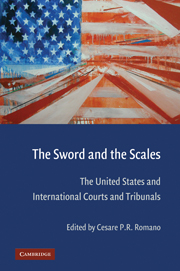Book contents
- Frontmatter
- Contents
- Preface
- Acknowledgments
- Abbreviations
- Contributors
- 1 International Courts and Tribunals and the Rule of Law
- 2 American Public Opinion on International Courts and Tribunals
- 3 Arbitration and Avoidance of War: The Nineteenth-Century American Vision
- 4 The United States and the International Court of Justice: Coping with Antinomies
- 5 The U.S. Supreme Court and the International Court of Justice: What Does “Respectful Consideration” Mean?
- 6 U.S. Attitudes toward International Criminal Courts and Tribunals
- 7 The United States and the Inter-American Court of Human Rights
- 8 From Paradox to Subsidiarity: The United States and Human Rights Treaty Bodies
- 9 The U.S. and International Claims and Compensation Bodies
- 10 Does the United States Support International Tribunals? The Case of the Multilateral Trade System
- 11 The United States and Dispute Settlement under the North American Free Trade Agreement: Ambivalence, Frustration, and Occasional Defiance
- 12 Dispute Settlement under NAFTA Chapter 11: A Response to the Critics in the United States
- 13 The United States and International Courts: Getting the Cost-Benefit Analysis Right
- Index
1 - International Courts and Tribunals and the Rule of Law
Published online by Cambridge University Press: 05 June 2012
- Frontmatter
- Contents
- Preface
- Acknowledgments
- Abbreviations
- Contributors
- 1 International Courts and Tribunals and the Rule of Law
- 2 American Public Opinion on International Courts and Tribunals
- 3 Arbitration and Avoidance of War: The Nineteenth-Century American Vision
- 4 The United States and the International Court of Justice: Coping with Antinomies
- 5 The U.S. Supreme Court and the International Court of Justice: What Does “Respectful Consideration” Mean?
- 6 U.S. Attitudes toward International Criminal Courts and Tribunals
- 7 The United States and the Inter-American Court of Human Rights
- 8 From Paradox to Subsidiarity: The United States and Human Rights Treaty Bodies
- 9 The U.S. and International Claims and Compensation Bodies
- 10 Does the United States Support International Tribunals? The Case of the Multilateral Trade System
- 11 The United States and Dispute Settlement under the North American Free Trade Agreement: Ambivalence, Frustration, and Occasional Defiance
- 12 Dispute Settlement under NAFTA Chapter 11: A Response to the Critics in the United States
- 13 The United States and International Courts: Getting the Cost-Benefit Analysis Right
- Index
Summary
It should be uncontroversial that the United States is among the world's leaders in supporting the development of international courts and tribunals. For example, in the economic arena, the United States has long been dedicated to the resolution of disputes through specialized tribunals, and we have continued that commitment through our cooperation with dispute settlement panels under the World Trade Organization. We have also been a leading advocate of ad hoc tribunals to resolve disputes between investors and states pursuant to bilateral and multilateral investment agreements.
This chapter, however, focuses on two other categories of international courts and tribunals: (1) tribunals for the resolution of state-to-state disputes over the rights and obligations of states under international law, such as the International Court of Justice (ICJ), and (2) criminal tribunals through which the international community seeks to hold individuals accountable for war crimes and other atrocities, including the International Criminal Tribunals for the former Yugoslavia (ICTY) and Rwanda (ICTR), the Special Court for Sierra Leone, and the International Criminal Court (ICC).
Contrary to what is sometimes suggested, the United States believes that such state-to-state and criminal tribunals make valuable contributions and has therefore supported them in both word and deed. International courts and tribunals can assist states in resolving disputes that they have been unable to settle through ordinary diplomacy. They can provide an alternative to the resolution of disputes or the adjudication of criminal liability through domestic courts that may be ill equipped or ill suited to address particular matters.
- Type
- Chapter
- Information
- The Sword and the ScalesThe United States and International Courts and Tribunals, pp. 1 - 11Publisher: Cambridge University PressPrint publication year: 2009
- 1
- Cited by



